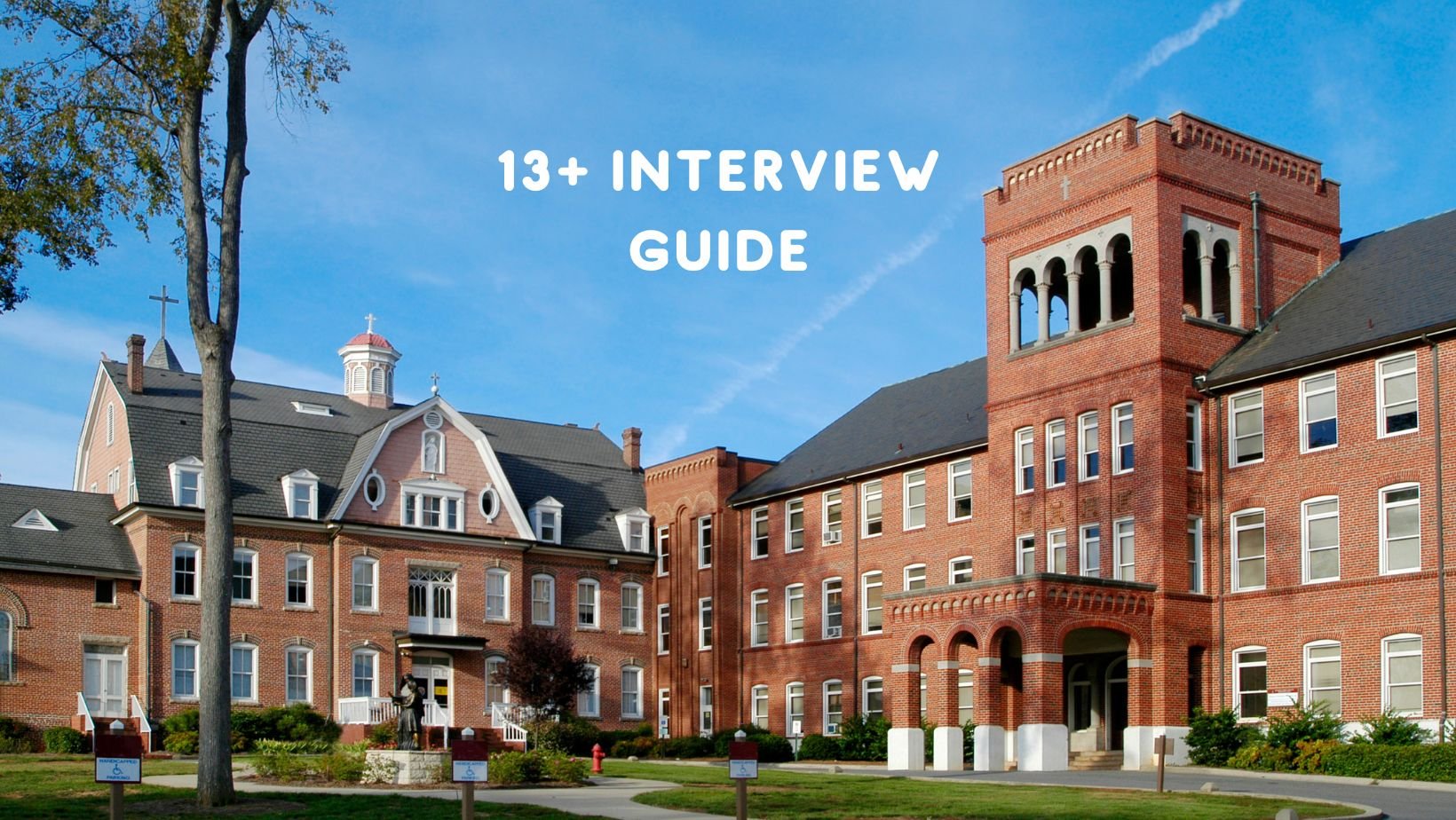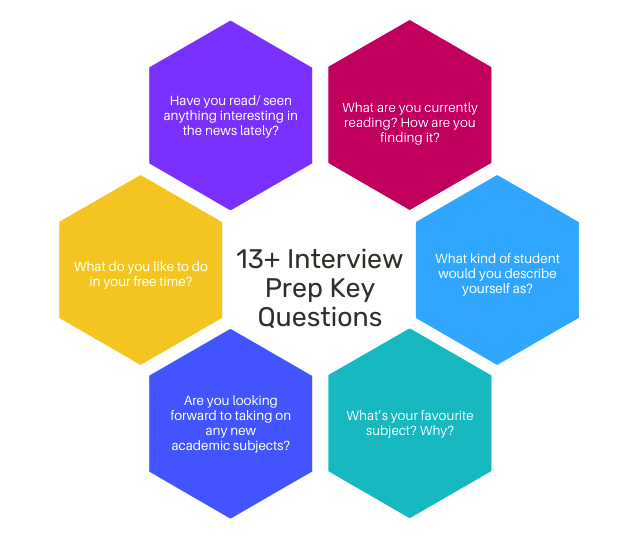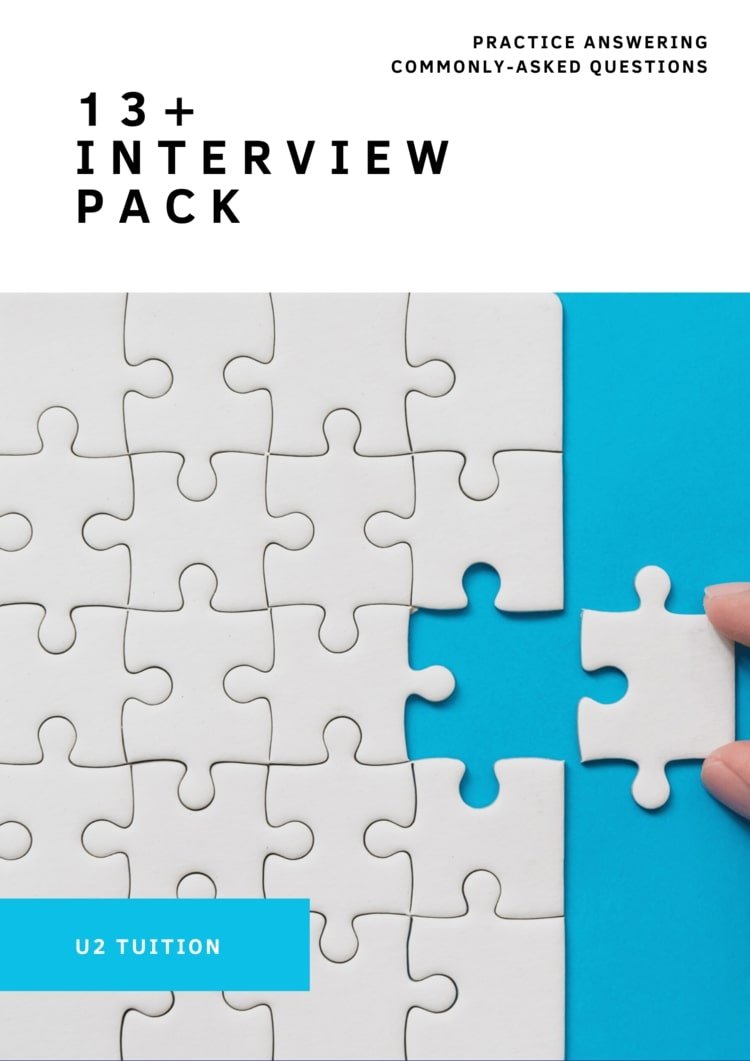How to Ace the 13 Plus Interview in 2025: A U2 Admissions Guide
Preparing for 13+ school entry interviews may seem daunting, especially when confronted with seemingly complex questions. Success in these interviews hinges on students’ ability to deconstruct each question and respond effectively. If they are new to the interviewing process, this may appear more challenging than it actually is. To enhance students’ skills in deciphering questions and rapidly crafting well-structured responses, you've come to the right resource.
What are typical formats of 13 plus/ common entrance interview questions?
While interview question styles may vary between schools, some common themes consistently appear. These interview questions can generally be grouped into three main categories:
Current Affairs and General Knowledge: These questions often aim to gauge students’ critical thinking skills and knowledge of current events. Answering them effectively can be challenging, as they require broad knowledge and the ability to analyse and structure a thoughtful response. We'll provide detailed guidance on handling these questions later in this guide.
Academic and Subject-Specific: These questions assess students’ understanding of the subjects they have studied and their ability to recall and apply that knowledge. This could include verbal analysis of a passage from a literary text or mental maths questions.
Personal Questions: This category delves into students’ extracurricular activities, hobbies, and personal interests. Approaching these questions strategically can help students present the best version of themselves during the interview.
In this guide, we'll provide valuable insights and tips to help students excel in their 13+ interview preparation, addressing various aspects, including providing example 13+ interview questions, so you can confidently navigate this important process.
1) Current affairs/ general knowledge/ “see how you think” 13 plus interview questions
These questions can be some of the hardest, because there is no way of telling exactly what will come up, unlike the other two kinds of questions. Therefore, in order to answer these properly, students need to be able to think on their feet, understand a question properly, dissect it, and address each part when answering.
Firstly, understanding the question. It is okay to ask for the question to be clarified if not fully certain of what the interviewer means. For instance, if unsure of a certain word, students should not feel they cannot ask for clarification on this. Once sure of all the words, they should take some time to think about the question. Whilst taking this time, they can think about the kind of question they have been asked and what an answer to this ‘question type’ requires. (Doing this will help to calm them down and point out some ‘knowns’ when they may feel stressed or overwhelmed).
Explain – if a student is being asked to explain something, this requires them to elaborate their answers. Answering ‘yes’ or ‘no’ or giving a short sentence won’t be enough here. A student could think of structuring their answer with PEE – point, evidence, explanation. This should give them a structure and ensure they do not waffle aimlessly!
o Example: if asked to “explain a piece of current affairs, for instance, global warming”, a student’s point might be that the world is getting warmer, evidence for this is that ice caps are melting, and then they could explain some of the actions we can take to reduce this/ or wider effects this has
Compare – if a student is asked to discuss the similarities/ differences of two things, they should start by explaining each. After they have done this, they can choose 2/3 points of discussion and talk about how each of their items relates to these points
o Example: “compare money and talent”. There is no right answer, the interviewer just wants to see how students think; they could try thinking of one way they are similar (perhaps they are both helpful to the person who has them), and one way they are different (for instance, money is something you can lose quickly, but if somebody is talented, they usually remain so)
Definition – if a student is simply asked what something is, this might seem like an easy answer, but the challenge is making sure their answer is impressive. If they are asked “what is kindness?”, they could start with a ‘dictionary style’ definition and maybe try and think of what examples of kindness there are in the world – do these all share one thing in common? What? How can they still be different? This is another question where you cannot be wrong, so they can present their unique opinions with examples and explanation in order to really impress the interviewer
Further 13 Plus Practice Questions (Remember, a student’s opinion counts - they should present both sides of the argument if they can, then choose their side)
What do you think is the greatest threat facing humanity today?
Do you think plastic bags should be banned? (Our co-curricular division, Minds Underground, hosts a yearly essay competition for Young Minds (U15) and this question was one of the past options! Essay competitions are great for students to mention at interview to demonstrate academic motivation)
Do you think all healthcare should be free? Or that people should be legally required to get vaccines?
What is your opinion on online learning?
If you were running for Prime Minister right now, what would your top three priorities be and why?
2) Academic/ subject specific 13+ questions
There is a lot of advice available for answering subject specific questions. A student may be asked to solve a maths question (e.g. a recent Harrow interviewer asked a student what 8 divided by 3 was), read a poem, or speak about a book they have read. These questions are typically easier to prepare for, since they will be used to answering questions of this style in their current school and for homework. One thing that could be useful is to think about which subject is their favourite and why. Interviewers are interested in students’ academic interests, so preparing to be asked about this is wise. For instance:
Science: Science might be a student’s favourite subject because of how well it helps us understand the world around us, because it allows us to draw conclusions from experiments etc.
Maths: Maths might be their favourite subject because they enjoy working with numbers and problem solving, working through a logical process to arrive at an answer etc. A student may have partaken in the Junior UKMT Maths Challenge to develop problem solving skills further
English: English might be their favourite subject because it allows them to discuss and defend their opinions on certain books or poems, it allows people to interpret different things from the same stimulus, reading can take you to different parts of the world and time etc. It can be useful for a student to keep a book chart of recently read books, including a few notes on key themes and their opinion on the book
Further 13 Plus Academic Practice Questions
Science: What scientific breakthrough in the last 100 years are you most excited about?
Maths: What is 98% of £7?
English: Have you read a book that was set outside of England/ that enabled you to learn about another culture?
Looking for ideas for impressive talking-points at 13+ interviews?
We have built out an entire co-curricular platform, Minds Underground, with a range of exciting extracurricular academic opportunities for young inquisitive minds (U14), perfect to mention at interview. A few ideas:
Minds Underground™’s debate classes hone public speaking & communication skills. Hosted by UK National Debate Team Coaches & World Championship Level debaters, with experience training students for UK school interviews
STEM Club: Our blog, Exploring the Realms of Off-Curriculum Scientific Learning, details exactly why students should explore science subjects beyond what they are doing at school. Hosted by our Oxbridge Science tutors, the STEM Club is perfect for interviewees with a passion for science to demonstrate wider exploration at interview.
Speech & Communication Courses - We regularly host Junior Speech & Performance literary courses for students to boost communication & public speaking skills
View all Clubs & Courses and visit Young Minds for more ideas!
3) Questions about you
Unlike the other types of questions, these questions require no additional kind of knowledge, as they are centred around the student. This is a real opportunity for a student to let the interviewer get to know them and the kind of student they are. Some ideas for a student to talk about themself well:
Talk about your extra-curricular activities and hobbies – let the interviewer know what kind of skills, interests and attributes you will bring to the school
Speak about your achievements (academic and non-academic) – show that you are an achiever and driven by speaking about the achievement and why it is special to you
Ambitions – let the interviewer know what some of your aims are for when you grow up, let them know why you are interested in those pursuits especially
With these questions, there is a balance that needs to be found between over-confidence and being too shy; likewise, students need to strike a balance between showcasing their achievements and not seeming as if they are bragging – remember they are looking for well-rounded, sociable and kind students too.
Further 13+ Practice Questions (Students can practise by creating a list of their strengths & ambitions, and back each one up with examples which illustrate that strength)
Give me an example of a time when you had to make a difficult decision?
Tell me about a time when you worked well as part of a team - how did you contribute?
What makes you unique?
What are you passionate about?
What global challenge would you most like to solve?
Remember, students may also be asked about their weaknesses! They should be truthful - what are they trying to improve? For example, a student may desire to improve their public speaking skills and… incidentally the school has a top debating society - perfect!
If a student can do all of the things mentioned above, they will leave a lasting impression on the interviewer. Remember that the most important things are for a student to be themself and answer the questions to the best of their ability (by breaking them down, analysing them, and answering in accordance with this). An interview is a great opportunity for them to showcase why they are a great candidate – they should seize it!
Looking for more insight into frequently-asked common entrance/ 13+ interview questions?
This 15-page guide includes interview questions based on typical questions asked by the top UK schools, including Eton College, Winchester, St. Paul’s School and Harrow. Gain insight into the types of questions asked at interview and top tips for efficient preparation:
Questions about the school
Thinking and forming an opinion (current affairs & debate)
Extracurricular profile: interests and achievements
Personality test questions/ Answering situational questions
Mental Maths questions
Literary skills test
Academic questions
We also offer full 13+ interview and Common Entrance tuition:
Our team of Oxbridge graduates, including alumni from the majority of top UK schools, are well-versed in hosting 13+ practice interviews and building skills in critical discussion, alongside our full 13 plus tutoring programmes (pre-test preparation, Common Entrance support etc.) We also host 13+ Interview training and mock interview sessions (from £75/h + VAT).
Contact us, book a complimentary consultation and we will suggest a suitable interview preparation mentor based on the student’s specific requirements.





